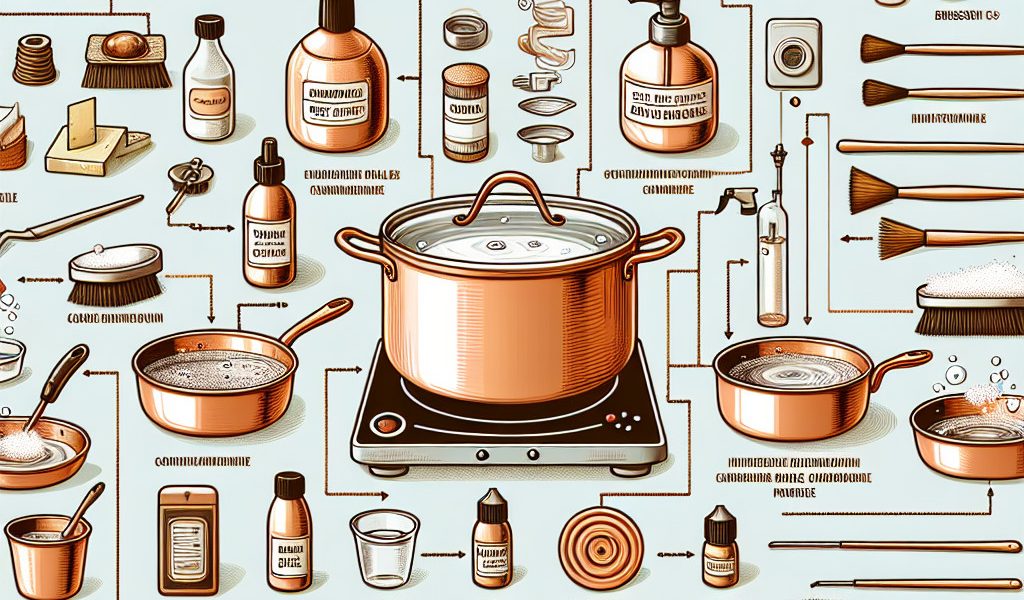Polishing Perfection: Expert Guide to Making Your Copperware Induction-Ready and Super Clean
Introduction
Copper is a noble material, appreciated for its thermal conductivity and its ability to distribute heat evenly. It is therefore very popular in cooking, particularly for the manufacture of utensils such as pots, pans or pots. However, copper can tarnish and oxidize over time. To preserve its shiny appearance and its properties, it should be cleaned regularly. In this article, we offer you a complete guide to copper cleaning methods as well as tips to avoid scrubbing. In addition, we will explain to you how to make your copper utensils compatible with an induction hob and what are the advantages of using this type of cooking.
Classic copper cleaning methods
Use a specific product for copper
To maintain your copper objects without too much effort or risk of damage, opt for a product specially designed for this purpose. You can find these products in supermarkets or specialized stores in liquid or paste form. Simply apply the product to the object to be cleaned using a soft, non-abrasive cloth then rinse thoroughly before drying.
White vinegar and salt
The mixture of white vinegar and salt is a natural, economical and effective solution for cleaning copper. Pour white vinegar into a container, add a pinch of fine salt then mix. Soak a soft cloth with this mixture and gently rub the copper object until the stains disappear. Then rinse with clean water and dry with another clean cloth.
Lemon and salt
Lemon is also very effective in restoring shine to copper. Simply cut a lemon in half, sprinkle fine salt on the cut part then rub the copper object directly with the lemon. Leave it on for a few minutes before rinsing with plenty of clean water then drying carefully.
Tips for cleaning copper without scrubbing
Baking soda
Baking soda is known for its mild abrasive properties that help remove stains without damaging the copper surface. Mix it with a little lukewarm water to form a thick paste that you will apply to the object to be cleaned. Leave it on for about 15 minutes then rinse with clean water before drying.
Soaking in an acidic solution
To avoid rubbing, you can also soak your copper items in an acid solution. Fill a container with white vinegar or lemon juice then add a pinch of fine salt. Immerse the copper object and leave it to act for a few hours or even overnight for the most stubborn stains. Then rinse with clean water and dry thoroughly.
How to Make Copper Cookware Induction Compatible
To benefit from the advantages of an induction hob while keeping your copper utensils, there are suitable solutions:
- Use an adapter disk: This metal disc is placed between the induction hob and your copper utensil, allowing heat to be transmitted without damaging either the cooking surface or the utensil.
- Buy specific utensils: Some brands now offer copper pots and pans with a special induction-compatible base.
The advantages of using an induction hob
Using an induction hob has several notable advantages over other cooking methods:
- Energetic efficiency : The energy is directly transmitted to the container without dispersion, which allows a rapid rise in temperature and limits electricity consumption.
- Security : The induction hob only heats up when a compatible container is placed on it, which limits the risk of burning and avoids wasting energy.
- Precision : The temperature can be adjusted easily and very precisely, allowing optimal control of cooking.
- Easy cleaning: Induction hobs are generally made of glass ceramic, a smooth and durable surface that is simply cleaned with a damp cloth or soft sponge.
Conclusion
To preserve the shine and properties of copper, it is essential to properly maintain your utensils. Thanks to our advice on different cleaning methods as well as tips to avoid rubbing, you will now know how to take care of your copper objects. In addition, if you want to benefit from the advantages of an induction hob while keeping your copper utensils, consider suitable solutions such as adapter discs or specific utensils compatible with induction.
